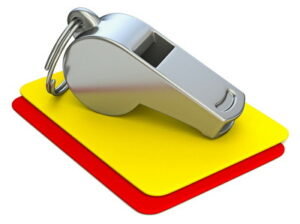 In football matches, there are countless moving parts that can have an impact on the outcome of what is happening. Goals change games, which is a mantra that has been spouted by players, managers and commentators alike for almost as long as the game has been in existence.
In football matches, there are countless moving parts that can have an impact on the outcome of what is happening. Goals change games, which is a mantra that has been spouted by players, managers and commentators alike for almost as long as the game has been in existence.
Another thing that changes games in a major way is sendings off. These go hand-in-hand with bookings, especially thanks to the rule that says that two yellow cards will result in the issuing of a red card. When a player has been shown one yellow, therefore, they’re walking a tight-rope for the rest of the match.
Managers would, understandably, lose their rag over players that have been sent off having picked up two yellow cards. After getting the first one, they should be on their best behaviour to avoid picking up a second one, so those in charge of the team hate it when a player displays such brainlessness by getting a second booking.
Managers, as with their coaches and players that aren’t on the pitch, are also at risk of being sent off by the referee. This can happen at any point during the match, as well as both before and after a game gets underway.
Yellow Card Offences
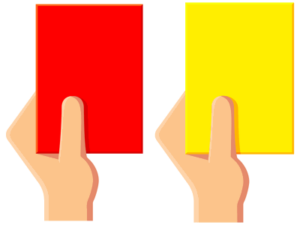 The first thing to look at is yellow and red cards and the reasons that referees can issue them. In theory, there are specific things that the referee should book players for or show them a red card when the offence has been committed. In practice, different referees will handle games in different ways, often not booking a player because of the context of the match, say, or refusing to send one off because they are the England captain and ‘not that sort of player’. It can be frustrating for supporters to see such things play out, but they happen every game week.
The first thing to look at is yellow and red cards and the reasons that referees can issue them. In theory, there are specific things that the referee should book players for or show them a red card when the offence has been committed. In practice, different referees will handle games in different ways, often not booking a player because of the context of the match, say, or refusing to send one off because they are the England captain and ‘not that sort of player’. It can be frustrating for supporters to see such things play out, but they happen every game week.
This is because the ultimate arbiters of what is or is not a bookable offence is the referee. The Football Association has rules and regulations in place, though, so it is at least helpful to get a sense of what a yellow or red card might be issued for. Yellow cards are shown when players commit what is referred to as a Cautionable Offence’. The list of such offences is quite long, including, but not limited to, showing dissent to the referee, unsporting behaviour and delaying the re-start of play. Unsporting behaviour can also include poor tackles.
Indeed, the list of things that come under the guise of being unsporting behaviour is even longer than the list of cautionable offences, with the likes of attempting to deceive the referee by faking an injury or pretending to have been fouled things that can be shown a yellow card. If a player handles the ball in order to interfere with a promising attack, or even stop it entirely, then that is a bookable offence. In fact, any action that does that, unless the referee gives a penalty, will result in a booking. Tackles that result in a direct free-kick being awarded are also bookable.
There are almost too many intricacies to go into when it comes to cautionable offences. The interesting one is when a referee awards a penalty, given that this can either be a red-card offence of a yellow card depending on whether there was a genuine attempt to play the ball. That is to say, a player going in for a tackle and getting his timing wrong, tripping the attacker, will concede a penalty but only be shown a yellow card. If a player deliberately kicks the opposition player with no attempt to play the ball, they’ll concede a penalty and be shown a red card.
Even goal celebrations can result in a player being booked, if it is deemed to be excessive. Though leaving the field itself is not a cautionable offence, it can be if it causes an unnecessary delay to the match re-starting. Meanwhile, climbing onto the perimeter fence or approaching supporters in a way that poses a security risk is also something that a player can be booked for. The removal of a shirt or covering the face or head with a mask will also end up in a player being shown a yellow card, as will gesturing in a provocative manner.
The final thing that is worth mentioning here is that excessive delays to play being re-started can result in a yellow card being shown to the guilty party. This can including the likes of a player appearing to get ready to take a throw-in only to leave it to a teammate, or being slow in leaving the pitch after being substituted. Taking a free-kick from the wrong position in order to force a re-take is a clever move to waste time, but can result in a booking. Similarly, kicking the ball away after the referee has stopped play can see a player be booked for time-wasting.
Red Card Offences
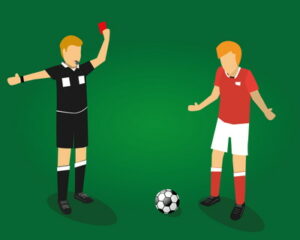 As well as being shown yellow cards, players can also be sent off during football matches. This can happen for a number of reasons, with the most frustrating to most people being because a player has committed two yellow card offences.
As well as being shown yellow cards, players can also be sent off during football matches. This can happen for a number of reasons, with the most frustrating to most people being because a player has committed two yellow card offences.
Straight reds, meanwhile, tend to be issued for more egregious breaches of the rules that are put in place to govern matches. One of the main ones of these is when a player has committed a foul that the referee feels constitutes serious foul play. Equally, the likes of biting and spitting is a red card offence.
Violent conduct in general is not approved of in football matches. Of a similar vein is the idea of using insulting or abusive language, or acting in an abusive or insulting way. There is also the act of denying an obvious goal-scoring opportunity This is a red card offence any time that there is no genuine attempt to play the ball. In other words, a push, shove or trip that would not constitute a genuine attempt to play the ball will see a player sent off.
This includes handball offences that are not accidental. When it comes to denials of obvious goal-scoring opportunities, referees are asked to think about the following:
- The location of the defenders and the number of them
- The general direction of play
- The distance between where the offence occurred and the goal
- The likelihood of the player who was offended keeping or gaining control of the ball
After thinking about all of those things, a referee might interpret what has happened as a red card worthy offence, or they might feel that it doesn’t meet the criteria for a red card and instead choose to book the player responsible for the action.
When Cards Can Be Issued
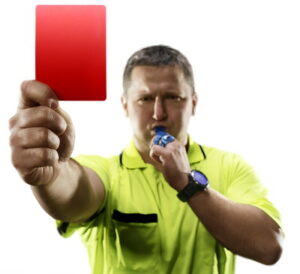 Though some people might think that a match has to be underway in order for a referee to issue a yellow or red card, that isn’t actually the case. Referees are able to take disciplinary action from the moment that they enter the field of play for the pre-match inspection, meaning that a player could theoretically be sent off before a ball has even be kicked.
Though some people might think that a match has to be underway in order for a referee to issue a yellow or red card, that isn’t actually the case. Referees are able to take disciplinary action from the moment that they enter the field of play for the pre-match inspection, meaning that a player could theoretically be sent off before a ball has even be kicked.
Similarly, their ability to take disciplinary action lasts up until they have left the field of play at the conclusion to a football match, which includes penalty kicks.
Should a player be sent off before the match is underway, they can be replaced in the starting eleven by one of the substitutes. They cannot be replaced by someone that wasn’t named in the match day squad and the person that moves from the substitutes bench into the starting eleven also can’t be replaced by someone not in the match day squad.
It isn’t just red cards that can be shown before kick-off, with yellow cards also able to be shown. This means that a player could be booked before a match starts, then be sent off after just one cautionable offence during the match itself.
Substitutes
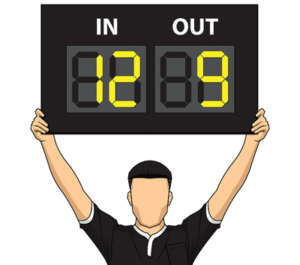 It is worth bearing in mind that it isn’t just the players on the pitch that can be shown red cards.
It is worth bearing in mind that it isn’t just the players on the pitch that can be shown red cards.
Before the match gets underway, referees can obviously caution any player, irrespective of whether they were due to be in the starting line-up. Even once a game is underway, an official can choose to caution any of the substitutes as well as the players that have already left the field of play having been substituted.
When it comes to subs or players that have already been subbed, they can be cautioned for any of the following:
- Entering the referee review area
- Dissent, either verbally or by a physical action
- Entering the field of play or re-entering the field of play without being given permission by the referee to do so
- Excessive use of the review signal
- Unsporting behaviour
- Delaying the restart of play
As with players in the starting line-up, two separate cautionable offences committed in quick succession can result in two yellow cards being shown and the red card that follows. All of the rules that apply to players on the pitch will also apply to subs, such as violent conduct, spitting or biting seeing them send off.
Team Officials

As well as the players, both those that start matches and the ones that are lined up to be substitutes, team officials can also be shown yellow and red cards. This includes managers, goalkeeping coaches, assistants, medical personnel and so on. In instances where the perpetrator of an offence cannot be identified, the manager will be shown the red card in their stead. Sometimes, referees will choose not to issue a yellow or red card to a team official and will instead simply issue them with a verbal warning. That is usually the case for the following:
- Entering the field of play in a manner that is deemed to be respectful or non-confrontational
- Ignoring requests or instructions from the likes of the fourth official or otherwise failing to co-operate with someone
- Disagreeing with a decision in a low-level manner
- Leaving the technical area when other offences haven’t been committed
They are thought of as being different actions in their nature to ones that would result in a club official being shown a yellow card. The list of yellow card offences includes, but isn’t limited to, the likes of clearly and persistently leaving the technical area or deliberately entering the opposition team’s technical area in a non-confrontational manner. Dissent, such as sarcastic clapping or throwing an object like a drinks bottle would be a bookable offence, as would entering the referee review area or excessively asking for a review to be carried out.
Team officials can also be sent off. This tends to happen when the offence that they’ve committed is going even further than an offence that would result in a yellow card being shown. Entering the opposition’s technical area in a confrontational manner, for example. Here’s a look at some of the other red card offences for team officials:
- Deliberately doing something to get an object onto the field of play
- Entering the Video Operation Room
- Showing dissent towards a match official
- Confronting a match official after deliberately entering the field of play, including before and after the match
- Demonstrating physically aggressive behaviour, such as kicking, biting or punching, opposition staff or match officials
- Receiving a second caution during the same match period for any reason
In the modern era, it doesn’t need to be the referee or even one of their officials at the stadium that makes a decision regarding a sending off. The invention of the Video Assistant Referee means that match officials will sometimes have the ability to communicate with an assistant that is able to re-watch an incident on a television monitor and inform them when they might have missed something. Sometimes, referees will be advised to go over and watch something again themselves on a monitor, changing their original decision after doing so and sending someone off as a result.